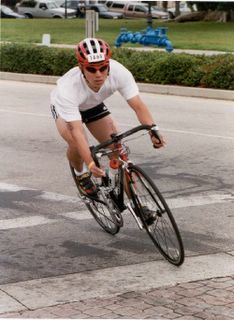I live in one of the top 25 fattest cities
Men's Fitness recently published the Top 25 Fittest and Fattest Cities in the Country. Kansas City was ranked #18.
America's Fattest Cities 2005
Location, location, location. It's the mantra of real estate agents, retailers, and, apparently, obesity researchers.
You may think that the place you call home is less important to your waistline than, say, genetics or your heinous eating habits, but you'd be wrong. Sure, those things matter — a lot — but they're not the only factors determining your overall fitness. That's why, for the past seven years, Men's Fitness has, well, weighed elements like commuting time, weather patterns, and even the total number of temptations (i.e., Dunkin' Donuts) you face each day as part of our exhaustive annual survey of size.
Our panel of experts put every city on a scale of sorts and considered the real-world factors that make all people — including guys just like you — more likely to put on pounds. What we saw wasn't pretty. But for every horror story (Texas! What the hell are you guys eating?), there were also some encouraging success stories, signs that some cities are cleaning up their act — and slimming down in the process. How does your city measure up?
Kansas City
Kansas City climbed up four positions, due to better sports participation, less TV watching, and a good commute. However, the city is held back by poor nutrition statewide and a higher than average health risk related to residents with weight issues, according to the CDC. Kansas City does have some hope — fast food and donut shops number merely average, and its commute rate is the third best in the nation. And don't forget the parks: Kansas City ranks in the top ten in acres of city parks and open space among our cities surveyed.
BRAGGING RIGHTS AND SOBERING FACTS:
- Almost 6 out of 10 residents of K.C. residents weigh enough to raise their risk for health problems, according to a study by the CDC.
- According to the same source, nearly 27 percent of Missourians haven't been physically active at all for the past 30 days.
- Kansas City residents, unlike much of the nation, have a relatively stress-free and fast commute. According to the Urban Mobility Report from the Texas Transportation Institute at Texas A&M University, the average KC commuter spends only 10 percent longer commuting in peak traffic than the same trip would take during off-peak times. That's one of the best scores of any city in our survey. Commuter stress has been shown to increase the hormone cortisol, implicated in contributing to obesity.
—Natasha Chin
| REPORT CARD: Kansas City, MO | ||
| Healthy Habits | ||
| Fitness Centers/Sporting Goods Stores | B- | |
| Nutrition | F | |
| Exercise/Sports Participation | B | |
| Risk Factors | ||
| Alcohol | C- | |
| TV Watching | B | |
| Overweight/Sedentary | D | |
| Junk Food | C | |
| Environment | ||
| Air | C | |
| Climate | D | |
| Geography | F | |
| Urban Attributes | ||
| Commute | A | |
| Parks/Open Space | B- | |
| Recreation Facilities | B- | |
| Health Care | C- | |


<< Home